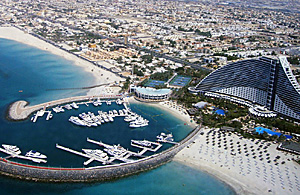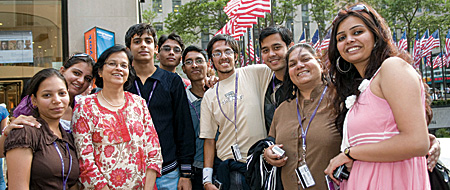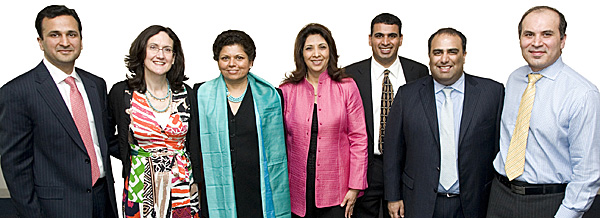
|
 |
(Top photo) Fatenah El Danab (second row, second from left), Josh Weiner (first row, second from right), and classmates take a boat tour in Jumeirah, Dubai, United Arab Emirates.
(Left photo) An aerial view of Jumeirah, Dubai, United Arab Emirates |
Tapping into the Middle East’s Emerging Markets
By Rika Nazem
As a Lebanese-American who has alternated between living and working in the US and Kuwait, Fatenah El Danab (MBA ’10) came to NYU Stern wanting to leverage her Stern connections with networking opportunities in the Middle East. It was fortunate, then, that she met fellow classmate Joshua Weiner (MBA ’09), who was establishing the United Arab Emirates (UAE) Initiative, under the auspices of the Emerging Markets Association (EMA) MBA club, which would allow students to explore economic and cultural opportunities in the Middle East.
El Danab, a Mohammad bin Rashid (MBR) Fellow, became a UAE Initiative officer and co-led the trek. “I have witnessed firsthand the economic boom in Dubai and the changing face of the Gulf Cooperation Council, which includes many setbacks as a result of the rapid expansion and the brain drain affecting that part of the world,” she said. “Seeing these changes motivated me to join EMA because of the chance to strengthen ties to the region and include Stern in its success.”
Weiner and El Danab didn’t expect the overwhelming student response they received for the trek: 18 full- and part-time MBA students traveled to Dubai and Abu Dhabi, visiting 13 companies in five days. The students also visited NYU Abu Dhabi and met with Stern alumni: “Hearing firsthand about living, working, and playing there was exciting for us, and it helped to confirm some students’ decisions to pursue a career in the region,” she said.
The students also experienced the cultural differences of doing business in the Middle East. Weiner said: “Business deals and opportunities often spring from your network, perhaps even more so than in other parts of the world. Your reputation is equally important; the business centers of Dubai and Abu Dhabi are still relatively small so you do business with the same people in your industry over and over again.” El Danab said that business in the Middle East is a blend of Western practices and traditional Arab values. “Business is not done very differently from New York or Singapore. However, there are certain norms that are generally accepted, and which some companies abide by strictly, such as allowing employees a break for their daily prayers and establishing shorter working hours during the month of Ramadan. Of course, the business attire tends to lean towards the more conservative side; no matter the type of business being conducted, it is always better to dress as bankers do in the US!”
Both Weiner and El Danab are pursuing work in the region: Weiner is working full time in venture capital and startups in Qatar, and El Danab interned during the summer at a top global logistics company in Kuwait. She will return to Stern to complete her MBA but has plans to return to the Middle East. “I want to help translate to the Middle East what I have learned and been privileged enough to experience in the US.”
 |
(Top photo) Students and chaperones from Mumbai visit Rockefeller Plaza.
(Right photo) Professor Venkataramani Srivatsan (front center) provided daily lectures to the Mumbai students in Stern’s Tisch Hall, pictured in the background. |
|
Stern Welcomes Exchange Students from India with Alumni Support
By Joey Schmit
In May, Ashwin Bhatia travelled for the first time to New York City for an extraordinary two-week experience. Bhatia was among 36 other students from Mumbai enrolled in the India Leadership Exchange Program, a new initiative that provides NYU Stern undergraduate students as well as students from India the opportunity to share classroom and cultural experiences across the two global business centers. Many of the Indian students were sponsored by the Stern School and generous Stern alumni, and could not otherwise have afforded to travel to and study in the US.
“This experience has been amazing,” remarked Bhatia, who attends HR College of Commerce in Mumbai. “There’s a certain energy to this place and we’ve received a very warm welcome.”
The students participated in a range of educational, cultural, and professional development programs over their two-week visit, which included daily lectures on global business taught by Stern’s Venkataramani Srivatsan, clinical professor of economics. In addition to academic lectures, students visited such cultural institutions as the Metropolitan Museum of Art and saw some of New York’s leading corporations, including American Express and Standard & Poor’s. “It’s amazing to learn so much, and Stern has been fantastic,” said Bhatia. “The experience means a lot, and we’re going to apply what we’ve learned back in India.”
On founding the program, Undergraduate College Dean Sally Blount said, “To be an educated leader in the 21st century, students need to know how markets, politics, religions, and cultures intersect across multiple countries. We believe that India and the US are markets in which this intellectual exchange is particularly critical.”
In January, juniors and seniors from Stern will travel to Mumbai, the commercial and entertainment center of India. “For Stern students, this is a phenomenal opportunity and I would encourage every business student to consider applying for this program,” said Yash Daga (BS ’09), a recent Stern graduate who helped welcome the students from India in May. “India is a very interesting place to study. As an economy, it is starkly different from the US in terms of size, economic stratification, industry composition, legal structure, social influences, and even entrepreneurial attitude. Be it language barriers, food adjustments, or other cultural learnings, the trip will be an assortment of challenge, adventure, and fun.”
Daga added, “The true value of such learning will be immeasurable, and I have no doubt that students will come out of this trip as individuals who are more aware and adaptable to social differences, more immune to cultural shocks, and more confident about their own abilities.”

(From left to right) Amit Gupta (MBA ’99); Sally Blount, NYU Stern Undergraduate Dean; Chandrika Krishnamurthy Tandon,
member of the NYU Stern Board of Overseers and Executive-in-Residence; Indu Shahani, Sheriff of Mumbai; Benoy Thanjan (BS ’97);
Ashish Contractor (BS ’97); and Kush Wadhwa (MBA ’02)


![]()